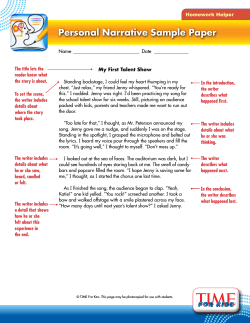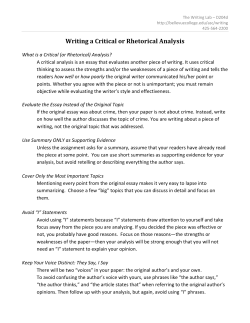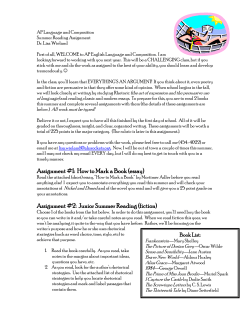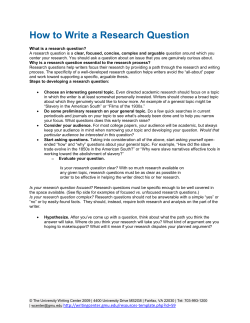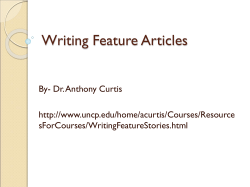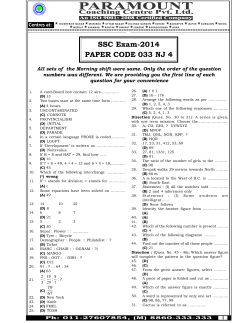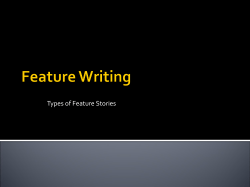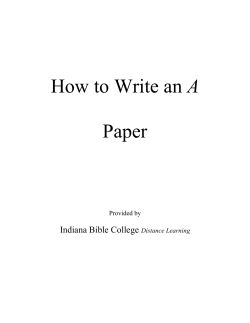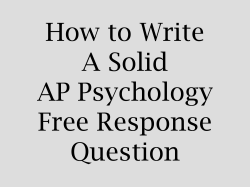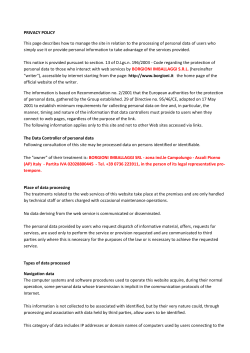
The Rhetorical Situation Created by Dr. Gary Cale Arts Department
The Rhetorical Situation Created by Dr. Gary Cale for the Language, Literature and the Arts Department Elements of the Rhetorical Situation Most composition theorists agree that five elements compose the rhetorical situation: writer, purpose, audience, topic and context. (Click on any of the links to the right and you will be taken to that element.) An understanding of each of these elements and its relationship to all the other elements will help you throughout the writing process and when you compose your audience and purpose statements for your portfolio. So, get ready to take some notes. You will be turning in these notes to your teacher to get credit towards the 16-hour requirement. Writer Purpose Audience Topic Context The Writer The writer has the most important role in the rhetorical situation because the writer ultimately decides what goes into his or her paper—unless of course an editor makes those decisions. Inexperienced writers often view writing as a totally egocentric activity. They produce what theorists call “writer-based prose,” which serves the purposes of the writer, but not necessarily the reader. Just as authors must be knowledgeable about the intended readers, authors must be knowledgeable about their own personal characteristics, points of view, assumptions, and interests. These elements help determine the kind of writing produced. In other words, the more you know about yourself, the more control you have over the myriad choices you make when writing an essay or even a letter. The Writer Who you are (at the time you begin to write) obviously determines to a large degree what kind of paper you can or will write. We are all a product of our socialization. Some of the factors—this list is not exhaustive—that help determine what you think about on any given subject include the following: your age, your experiences, your gender, your political beliefs, your education, your parents and peers, your religion. The Writer For instance, I am a 50-year-old white American male professor with a doctorate in education for democratic social change, educated at the tail end of the 1960s, who has taught for almost 30 years and whose parents were poorly paid teachers. How might I view the value of education? How might I view traditional schooling practices? How might I view the politics of education? How might I view teacher pay? Jot down your answers to these questions in your notebook. Explain your reasoning as well. The Writer The quick (and short) answer is that I highly value education, but hate schooling, find most politicians to be hypocrites when it comes to public education in particular, and think most teachers are underpaid. Is that what you thought? If so, congratulate yourself. If not, then what led you to a different conclusion? Jot down your answer. How I write (and think) is a reflection of what I have experienced, read, and been taught. What we see (think and write, as well) is what we’ve been “trained” or socialized to see. And that means all of us have blind spots; we have unchallenged assumptions about the world that colors how we think and write. Recognizing and challenging our assumptions is vital to our writing and intellectual well-being. The Writer Let’s consider a few other factors in a bit more detail. Jot down answers to the following questions. There are no “right” answers. Age—How might a sixty-year-old would write about social security reform as opposed to an eighteen-year-old? Experiences—How might someone who participated in 1960s street protest write about them as opposed to someone who had not? Socio-economic class—How might a CEO write about the subject of downsizing differently than a factory worker? Obviously, people change their mind, so it is possible that a ’60s protestor might find street protest to be unproductive today. So, it’s now your turn. Who are you? Jot down some factors you are aware of that may influence how you write and think about the world. The Writer So, let’s say you are writing a paper about buying a new car, the reinstatement of the draft, or the cost of college. How might such factors as your age, socio-economic class, experiences, family life and so on affect the kind of information you would include or the positions you take? Pick one of the examples above and jot down how such factors listed above might influence your writing. Write a short reflective statement (1-2 paragraph) on what you have learned about yourself. Purpose Can you remember a time when you knew your purpose for writing? Jot down as many examples as you can remember. Now jot down times you remember when you were not sure why you were writing or what effect you wanted to achieve. Which writings were successful? Unsuccessful? The second element we will explore is purpose. Successful writers have a clear purpose in mind when they write. Students forced to take composition classes often write without a clear purpose in mind. (I’m partially kidding. At the very least students are trying to satisfy a requirement in order to pass a class.) However, normally, writers know why they are writing and what effect they want to have on their audience. They have a clear reason for writing. This is why we study composition. Purpose Knowing your reason for writing is of paramount importance. Writing purposes can be best expressed in an infinitive statement: to + verb. (This will become especially important when you have to write your purpose statements for each paper in your portfolio.) In the past, I have written to inform, to persuade, to tell a story, to describe, to entertain, to shock. Of course, the list above is not exhaustive, but it does cover many of the kinds of writing you have been asked to do in our classes. List the kinds of writing you have been asked to do in high school, college, or on the job. Purpose Let me expand on just a few of these purposes. (And by the way, this concept applies to both written and spoken situations.) Recently I wrote to inform a group of adult educators about the results of an action research project I had conducted. (Recently my kids spoke to inform me about a special feature on The Matrix DVD.) During the last election I wrote to persuade newspaper readers to vote for a certain candidate. (Yesterday my daughter tried to persuade me that she could do three sports in the same season.) Just last week I composed a blistering letter to some of my lazier online students, partially designed to provoke them into action. (Recently my son tried to provoke me into discussing a closed topic.) Purpose and Genre Related to purpose is genre. A genre is a category of writing. For example, you might be asked to write fiction, an autobiographical narrative or story, a news article, a review, an editorial, a process analysis or an argumentative essay. The genre you choose hinges upon your purpose and the needs of the audience or intended readers. J.K. Rowling, an author of children’s stories, writes to entertain her audience. Molly Ivins, a political writer, attempts to persuade her readers to accept her ideas and to engage in political activity. Just for a moment, jot down all the different genres you have been explored in the last year or two. What were you asked to do in each? How were the expectations different or similar? How did the genre influence the kinds of information you included and the organization of your essay? Purpose Successful writers, in brief, always have a purpose in mind when they write. Successful students always understand the purpose of the writing assignment they have been given. It does you no good to write an informative paper (to inform) if you were supposed to write an argumentative paper (to argue for your position and against someone else’s position). So, pay attention to both purpose and genre. Understanding the purpose of the assignment does not guarantee a successful paper, but it does help. The same goes for essay exams. Learning to read the “code” of essay exam questions is invaluable. “Summarize the main points of authors A and B” is not the same thing as “contrast the main points of authors A and B,” is it? Audience The audience or intended readers, the group you are writing for, is affected by many of the same factors that influence the writer. Notice I wrote “group” in the sentence above. Too often in composition classes students imagine the teacher as their only audience. (Too often, as well, teachers give assignments where they clearly are the only possible audience. We need to work on that, even as you work on writing papers for a broader audience.) So, when you formulate your audience statements, carefully consider who might enjoy or benefit from your paper. If the only person you can think of is the teacher, you might produce a piece of writing with limited significance. Successful writers reward their readers with significance. (See the St. Martin’s Guide for help on significance.) Audience But for the moment, let’s assume that you have a wider, or at least different, audience in mind. So, what do you need to consider about your audience in order to write effectively? Well, at a minimum, you need to consider the following: age, social group memberships, education, group beliefs. Why do any of these matter? Well, have you ever felt like someone was talking down to you, treating you as if you were a child? How did that make you feel? Did you listen? Did the points he or she was trying to make resonant with you? Or did you ignore them, darkly muttering under your breath about what a jerk he or she was? If you are anything like me, I would guess that the latter is true. Audience So, let’s explore this concept in a bit more depth. Let’s say that you recently attended a fairly wild party, perhaps even a kegger. How might you write a letter to your parents about this party? To your best friend from high school? To your grandmother? To your priest? How might you write a pamphlet about sexual harassment for elementary school children, fraternity brothers/sorority sisters, or work supervisors? Jot down the differences we might expect to find in these letters. Jot down the differences we might expect to find in these pamphlets. What accounts for the differences you noted? Audience Undoubtedly, some of you are quite willing to tell the truth no matter what and so your letters would be basically the same. Maybe wildness at a party would not bother your grandmother, parents, or priest. But, I would be willing to bet that many of you would chose your words very carefully. You would include some details and omit others. Does that make sense? The same goes with the pamphlet on sexual harassment. Elementary school children cannot understand concepts like “hostile work/educational environment” or “quid pro quo.” Clearly, for this audience the vocabulary would need to be simpler and the examples given would need to be very concrete and based on life experiences of young children. Knowing as much as you can about your intended readers and their needs is clearly important. Topic When you are given an assignment, what is the first thing you think about? I’d be willing to bet that the topic is first thing you think about—unless of course your professor assigned the topic. When coming up with your own topic, you should consider the requirements of the writing assignment (genre, purpose immediately should come to mind), the required length of the paper, and the complexity of the issue. Many students attempt to write papers on very broad topics—which usually produces a very general paper. Narrowing the topic, making it more specific and focused, therefore, is a necessary first step towards building a more coherent, complete, clear, and compelling essay. Topic So, let’s pretend that you have been given a three-page limit. In your notebook jot down which of these topics might be too broad? Which might be too narrow? What might be just right? (Sounds a bit like Goldilocks and the Three Bears, doesn’t it?) What factors did you weigh in making your decision? Jot down your reasoning. The causes of global poverty The need for a new stoplight Reasons to pass/not pass a proposed millage The American social security crisis The history of the Viet Nam war The review of a new movie A personal narrative Topic The causes of global poverty, the American social security crisis, and the history of the Viet Nam war are broad topics andwould undoubtedly require book-length studies: However, the following topics should be narrow enough to work: the need for a new stoplight, reasons to pass/not pass a proposed millage, the review of a new movie, or a personal narrative. Of course, the more complex the topic, the longer the paper would need to be to cover all aspects. So, even seemingly simple topics like an argument for a millage request might take more space than you have been given in the assignment. Context Lastly, we must consider the context. Context is defined as the “situation” or “occasion” that generates the need for writing. The context is affected by the time period, location, current events, and the cultural significance of events or people under consideration. For example, 2001 newspaper editorials about terrorism were motivated by the 9-11 attacks. Before this, terrorism was treated as an abstract possibility. Articles about Iraqi civilian deaths are written with different purposes in the United States than those published in Iraqi newspapers. Nanotechnology is written about much differently today than it was in the 1990s. Keeping up-to-date on the social, political, and cultural climate of your audience can help you produce current, convincing writing. (And using the latest sources helps too.) Context In outside-of-school rhetorical situations, the topic, purpose, writer, and audience are all affected by what is going on in the world or local community. We write because we feel compelled to speak or write. Discovering that the College is considering raising tuition may prompt you to write the Board of Trustees. Clearly, if the paper has been assigned by a teacher, the occasion is generated by your teacher. You are not writing because you want to write (in many cases, anyway), but because you have been required to write. In that case, you must find a way to engage yourself in a topic that you do not find interested. Dull papers are often the product of disengaged students. So What? And What Next? In short, you need to be aware that a rhetorical situation exists EVERY TIME you sit down to write. Each time you write, whether it is for your professor or for the wider public, you need to examine all the elements of the rhetorical situation carefully in order to meet the needs of your audience. Until you understand the nuances of the rhetorical situation, at best you will be simply guessing as to what you should or should not include in an essay. The more you know about the rhetorical situation, the better chance you have of gaining control of your own work. Please print out this last slide if you wish 16-hour credit. Present this slide and your notes to your teacher. This workshop is worth 1.5 hours. So What? And What Next? Undoubtedly you are currently working on papers for your composition class and perhaps other classes as well. Before you turn in those papers, make sure that you have carefully considered all five elements. If the deadline is close at hand, show your teacher evidence that you have used this workshop to guide your thinking about your paper. Please print out this last slide if you wish 16-hour credit. Present this slide and your notes to your teacher. This workshop is worth 1.5 hours. If you have questions or comments, please send email to gary_cale@jccmi.edu. Thanks.
© Copyright 2025
